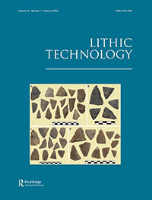
Lithic Technology
Scope & Guideline
Illuminating Human Prehistory Through Lithics
Introduction
Aims and Scopes
- Lithic Technological Analysis:
The journal emphasizes the detailed analysis of lithic technologies, exploring aspects such as knapping techniques, tool morphology, and manufacturing processes across various prehistoric cultures. - Experimental Archaeology:
A significant portion of the research published involves experimental approaches to understand ancient lithic production, use-wear analysis, and the functional capabilities of stone tools. - Cultural and Temporal Contextualization:
Papers frequently explore the cultural and temporal contexts of lithic technologies, linking archaeological findings with broader anthropological and historical narratives. - Material Science in Lithic Studies:
The journal incorporates studies on the material properties of raw materials used in lithic tool production, including petrology and geochemical analyses, which contribute to understanding sourcing and procurement strategies. - Interdisciplinary Approaches:
Lithic Technology encourages interdisciplinary methodologies, integrating insights from geology, ethnography, and experimental science to provide a holistic understanding of lithic artifacts.
Trending and Emerging
- Integrative Use-Wear Analysis:
There is a growing emphasis on use-wear and residue analysis, with researchers employing advanced methodologies to infer the functional aspects of lithic tools and their roles in prehistoric subsistence strategies. - Technological Efficiency and Resource Management:
Papers are increasingly exploring the efficiency of lithic production strategies and resource management practices, shedding light on the economic behaviors of prehistoric populations. - Interdisciplinary Collaborations:
Emerging studies often incorporate interdisciplinary approaches, combining insights from fields such as material science, digital archaeology, and anthropology to enhance understanding of lithic technologies. - Sustainability and Environmental Impacts:
Recent research has begun to address the sustainability of lithic resource exploitation and the environmental impacts of prehistoric tool-making practices, reflecting broader contemporary concerns. - Cognitive and Social Dimensions of Knapping:
There is an increasing interest in the cognitive and social dimensions of lithic technology, examining how knowledge transmission, skill acquisition, and social practices influenced tool production and usage.
Declining or Waning
- Traditional Typological Studies:
There has been a noticeable decrease in purely typological studies, which categorize tools based on form without integrating functional or contextual analyses. This shift suggests a movement towards more nuanced interpretations that consider the broader implications of tool use. - Descriptive Reports on Isolated Finds:
The publication of studies detailing isolated lithic finds without comprehensive contextualization has diminished, indicating a preference for research that situates artifacts within larger archaeological and cultural frameworks. - Over-reliance on Quantitative Metrics:
While quantitative analyses remain important, there is a declining trend in studies that focus exclusively on metrics without addressing qualitative aspects, such as the socio-cultural implications of lithic technologies.
Similar Journals
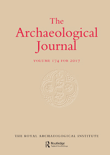
Archaeological Journal
Unearthing Insights, Shaping Tomorrow's ArchaeologyArchaeological Journal, published by Taylor & Francis Ltd, stands as a leading voice in the field of archaeology, with a remarkable distinction in the Q1 category for both arts and humanities as well as conservation, underscoring its critical role in advancing scholarly dialogue and research. With an ISSN of 0066-5983 and E-ISSN of 2373-2288, this journal provides a platform for innovative research from 1977, now offering insights up to 2024. The United Kingdom-based journal is highly regarded, being within the top 81st percentile in archaeology and conservation according to Scopus rankings. Essential for researchers, professionals, and students, the journal's content spans rigorous archaeological studies, theoretical advancements, and discussions on conservation practices, ultimately aimed at fostering a deeper understanding of humanity's past. Notably, with no open access option, it maintains a traditional publishing approach, thereby ensuring curated and high-quality contributions to the academic community.

Intersecciones en Antropologia
Advancing anthropological dialogue across borders.Intersecciones en Antropologia, published by the Universidad Nacional del Centro de la Provincia de Buenos Aires (UNICEN), Facultad de Ciencias Sociales, is a premier open-access journal in the field of anthropology, having established its presence since 2010. With an impressive impact factor and currently holding the distinguished Q1 quartile ranking in anthropology for 2023, this journal has quickly become a vital resource for scholars and practitioners alike, offering a platform for innovative research and critical discussion. The journal aims to advance anthropological scholarship by encouraging the dissemination of diverse perspectives and stimulating dialogue across geographical and cultural boundaries. Its open-access model, adopted in 2017, ensures that valuable research findings are accessible to a global audience, fostering collaboration and engagement within the academic community and beyond. Located in the vibrant cultural context of Argentina, Intersecciones en Antropologia serves as a conduit for significant anthropological dialogues, making it an essential read for those dedicated to understanding and contributing to the evolving landscape of social sciences.
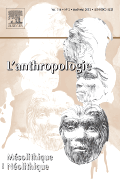
ANTHROPOLOGIE
Fostering Dialogue Between Anthropology and PhilosophyANTHROPOLOGIE, published by Elsevier France - Éditions Scientifiques Médicales Elsevier, is a leading academic journal dedicated to advancing the fields of Anthropology and the History and Philosophy of Science. With a publication history that dates back to 1947, this esteemed journal has steadily carved its niche within the scholarly community, achieving a commendable Q2 rank in both the aforementioned categories in 2023. Although it does not offer Open Access, ANTHROPOLOGIE provides robust access options through institutional subscriptions, ensuring that researchers and practitioners alike can delve into its rich repository of knowledge. The journal's impact is underscored by its competitive Scopus rankings, particularly its position within the 65th percentile for History and Philosophy of Science and 56th percentile within Anthropology. Through rigorous peer-reviewed articles that illuminate a wide array of anthropological inquiries and philosophical debates, ANTHROPOLOGIE continues to be an essential resource for those committed to exploring the complexities of human behavior, culture, and scientific understanding in an ever-evolving world.

Ethnoarchaeology
Innovating Insights: Discovering Cultural Narratives Through EthnoarchaeologyEthnoarchaeology, published by ROUTLEDGE JOURNALS, TAYLOR & FRANCIS LTD, stands at the forefront of interdisciplinary research within the realms of anthropology and archaeology. With an ISSN of 1944-2904 and an E-ISSN of 1944-2890, this journal has demonstrated an impressive impact, categorized in the Q1 quartile for both anthropology and archaeology as of 2023. Acknowledged for its influence, it ranks 72/413 in Archeology (arts and humanities) with an impressive 82nd percentile, making it a vital resource for researchers and practitioners. Over its converged years from 2014 to 2024, the journal aims to bridge theoretical and practical aspects of ethnoarchaeology, fostering a deeper understanding of cultural practices through archaeological perspectives. Its commitment to advancing knowledge in this unique field is of utmost importance for academics, professionals, and students dedicated to exploring the interplay between contemporary societies and historical archaeological practices.
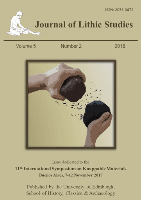
Journal of Lithic Studies
Pioneering insights into the art of lithic craftsmanship.Journal of Lithic Studies is a premier Open Access journal published by the University of Edinburgh's School of History, Classics & Archaeology, dedicated to advancing the field of lithics and stone tool studies. Since its inception in 2014, this journal has provided a valuable platform for researchers, professionals, and students to disseminate innovative research, explore new methodologies, and engage with the growing body of knowledge in archaeological sciences. The journal encompasses a wide range of topics within lithic studies, including technological analysis, experimental archaeology, and the cultural implications of stone tool production and use. As an open-access publication, the Journal of Lithic Studies ensures that groundbreaking findings are accessible to a global audience, fostering collaboration and scholarly dialogue within the archaeological community. With its commitment to high-quality research and interdisciplinary inquiry, the journal stands as a vital resource for those interested in the past and present significance of lithic technology.
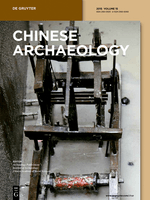
Chinese Archaeology
Illuminating the Pathways of Historical DiscoveryChinese Archaeology, published by WALTER DE GRUYTER GMBH, is a leading journal dedicated to the exploration and study of China's rich archaeological heritage. With an ISSN of 2160-5025 and an E-ISSN of 2160-5068, this journal serves as an essential platform for scholars, researchers, and enthusiasts in the field of archaeology, offering a blend of original research articles, reviews, and critical essays that address both contemporary issues and historical narratives. While it currently operates under a conventional access model, making cutting-edge research available to a select audience, it plays a crucial role in advancing knowledge about China's archaeological sites, artifacts, and past civilizations. Given the increasing interest in Eastern archaeology and its significance in a global context, Chinese Archaeology is positioned as a pivotal resource for understanding and interpreting the complexities of China’s historical evolution. Researchers and academics are encouraged to contribute and engage with this vital field of study to foster greater insights and innovations.
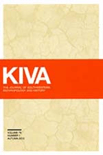
Kiva-Journal of Southwestern Anthropology and History
Unveiling the Past: Insights from the SouthwestKiva - Journal of Southwestern Anthropology and History is a distinguished academic journal published by Routledge Journals, Taylor & Francis Ltd, that serves as a vital resource for scholars in the fields of anthropology, archaeology, and history. With an ISSN of 0023-1940 and an E-ISSN of 2051-6177, this journal has established itself as a significant avenue for scholarly communication since its inception in 1964. It consistently ranks in the top quartiles, including Q1 in Archaeology and Q2 in Anthropology, reflecting its high impact and rigorous peer-review process. Covering a wide array of topics pertinent to the Southwestern United States, Kiva invites original research articles, reviews, and methodological papers that advance understanding of the region's rich cultural heritage and historical narratives. While currently not open access, its commitment to disseminating quality research makes it an essential reading for researchers, professionals, and students aiming to explore the multifaceted dimensions of southwestern studies.

Archeologicke Rozhledy
Fostering interdisciplinary dialogue in the heart of Prague.Archeologicke Rozhledy, published by the Academy of Sciences of the Czech Republic, Institute of Archaeology, is a pivotal open-access journal dedicated to advancing the field of archaeology. Since transitioning to open access in 2019, it has made significant strides in disseminating high-quality research, serving as a vital resource for researchers, professionals, and students alike. With an ISSN of 0323-1267, the journal has gained recognition for its contributions in the domains of arts and humanities, particularly archaeology, as evidenced by its 2023 Q2 ranking in both categories. Operating out of the historical city of Prague, the journal encompasses a broad scope of archaeological scholarship, reflecting a commitment to interdisciplinary approaches and fostering dialogue within the global archaeological community. With its notable Scopus rankings—#115/413 in Arts and Humanities and #113/354 in Social Sciences—Archeologicke Rozhledy stands as a crucial outlet for innovative research and scholarly exchange.

Archaeological and Anthropological Sciences
Bridging Disciplines, Uncovering InsightsArchaeological and Anthropological Sciences is an esteemed peer-reviewed journal published by Springer Heidelberg, specializing in the interdisciplinary fields of archaeology and anthropology. Since its inception in 2009, this journal has established itself as a pivotal resource for researchers and professionals, featuring cutting-edge studies that bridge the gap between the sciences and humanities. With its impressive 2023 Q1 rankings in Anthropology and Archaeology categories, the journal stands out in the Scopus landscape, ranking within the top 5% of its field—Rank #18/413 in Archaeology (Arts and Humanities) and Rank #28/502 in Anthropology. This is complemented by its commitment to disseminating high-quality research to a global audience, despite being a non-Open Access publication. The journal's scope encompasses innovative methodologies, archaeological findings, and anthropological insights that are vital for advancing knowledge and fostering academic discourse. As it moves toward its upcoming converged years, Archaeological and Anthropological Sciences continues to solidify its reputation as a key forum for scholarly exchange in these fields.

Bulgarsko e-Spisanie za Arkheologiya-Bulgarian e-Journal of Archaeology
Bridging past and present with open-access archaeological research.Bulgarsko e-Spisanie za Arkheologiya - Bulgarian e-Journal of Archaeology is a prominent open-access journal published by the ASSOC BULGARIAN ARCHAEOLOGISTS since 2011, serving as a vital platform for the dissemination of archaeological research and findings in Bulgaria and beyond. With the ISSN 1314-5088, this journal is dedicated to advancing knowledge in the field of archaeology, facilitating the sharing of innovative studies, fieldwork results, and theoretical discussions. It is particularly significant for researchers, professionals, and students who are interested in the archaeological heritage of Bulgaria, providing an accessible venue for high-quality scholarly contributions. The journal's commitment to open access ensures that its rich repository of knowledge is available to a global audience, enhancing collaboration and fostering new discoveries within the discipline.